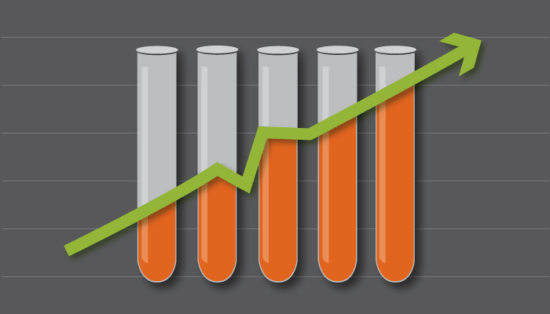Brand Insights
For Health Science Executives
Using Data to Improve Life Science Marketing
Using Data to Improve Life Science Marketing

Why data should be driving more of your life science marketing decisions
Data provides insights that drive better decision-making, and Life Science marketers that know how to translate it into action are much more likely to see positive results.
According to Bain & Company, companies that use data to make choices about how to operate are:
- 2x as likely to be top performers
- 3x as likely to execute decisions as intended
- 5x as likely to make decisions faster than their market peers
Many Life Science marketers have a marketing analytics tool in place but may not be maximizing its value because they lack the time or expertise.
Whether you are a life science startup just beginning a tactical approach, or a veteran brand using full-on marketing automation here’s why life science marketing teams should base more decisions on marketing analytics:
Data tells you when and how customers’ needs are evolving
Your customers and prospects have needs and interests that change over time based on new information, new trends and/or new technologies in the marketplace. Analyzing customer data ensures that you are not basing important marketing decisions on what worked in the past, but on what matters to your customers today.
Analytics programs allow you to mine for very specific sorts of data in order to form a clearer picture of prospects and their stage in the buying cycle. They also help you leverage that data to customize communications with personalized information and offers that can increase conversion rates.
- A report by DemandMetric shows that 82% of customers feel more positively about a company after receiving content customized to them.
Gathering better data about customers and potential customers empowers your marketing team to deliver higher levels of customization.
Data enables stronger and more focused marketing strategies
In addition to helping you deliver more customized content at each stage of the buying cycle, data gives you the insights you need to create more targeted marketing campaigns and programs.
With your business goal in mind pull the data sets that inform and support your efforts. Your team should begin with questions such as:
- How can we utilize our data to create a meaningful campaign/program?
- What additional information about prospects would make this campaign/program more effective?
- What metrics will we use to measure success?
Data tells you what’s working—and what’s not
Analytics data provides a foolproof way to find out if your messaging, campaigns and programs are resonating with specific individuals in your sales funnel. Having that information allows you to evolve your strategy in real-time to create marketing communications that more prospects will respond to.
For example, you might decide to pull data on your calls-to-action to see if they are effective with a certain audience. Knowing how they performed will allow you to refine and customize your CTA’s in order to cater to the needs and interests of those you want to reach.
Personalized CTAs result in a 42% higher conversion rate than generic CTAs. (Hubspot)
We are big proponents of A/B testing, which takes extra time, but experimenting with important messaging elements like CTA’s allows you to zero in on those that are working and create more efficiency in the conversion process.
Every life science brand uses a different mix of analytics tools and programs, which leaves a lot of room for creativity and experimentation. Once you become familiar with the types of data that matter most and know how to put that information into context, it will be easier for you to make marketing decisions based on analytics reports.
Data keeps your sales team informed
Data helps you build a more meaningful relationship with your prospects before they interact with your sales team. By feeding relevant data from your analytics platform straight into your CRM scoring system you can keep your sales team aligned with marketing efforts as they unfold.
Sharing customer information in this way can make the transition from lead to conversion more efficient by providing sales with the intelligence and warm leads they need to succeed.
Takeaway
Using data to improve life science marketing means thinking about analytics beyond a singular marketing campaign. Instead, make analytics an a ongoing commitment to stay connected to your prospect so that you can continually create more relevant communications and evolve marketing strategies collectively.